Alternative Provisions: Lockout to Future Success in Education
VerifiedAdded on 2020/06/06
|13
|4276
|73
Report
AI Summary
This report delves into the effectiveness of alternative educational provisions, particularly Pupil Referral Units (PRUs), in the UK. It explores whether these provisions, designed for students with various challenges, truly pave the way for future success. The literature review examines existing research on the impact of PRUs on student behavior, attitudes, attainment, and achievement, while also addressing potential barriers to future success. The research methodology employs a descriptive research design, combining interpretivism and positivism, and utilizes a deductive approach with both primary (semi-structured interviews) and secondary data sources. The report's analysis assesses the provisional outcomes in terms of student behavior, attitudes, attainment, and achievement and identifies the potential for alternative education to inadvertently hinder future success. The report concludes by summarizing the key findings and offering insights into the complex relationship between alternative educational provisions and student outcomes.
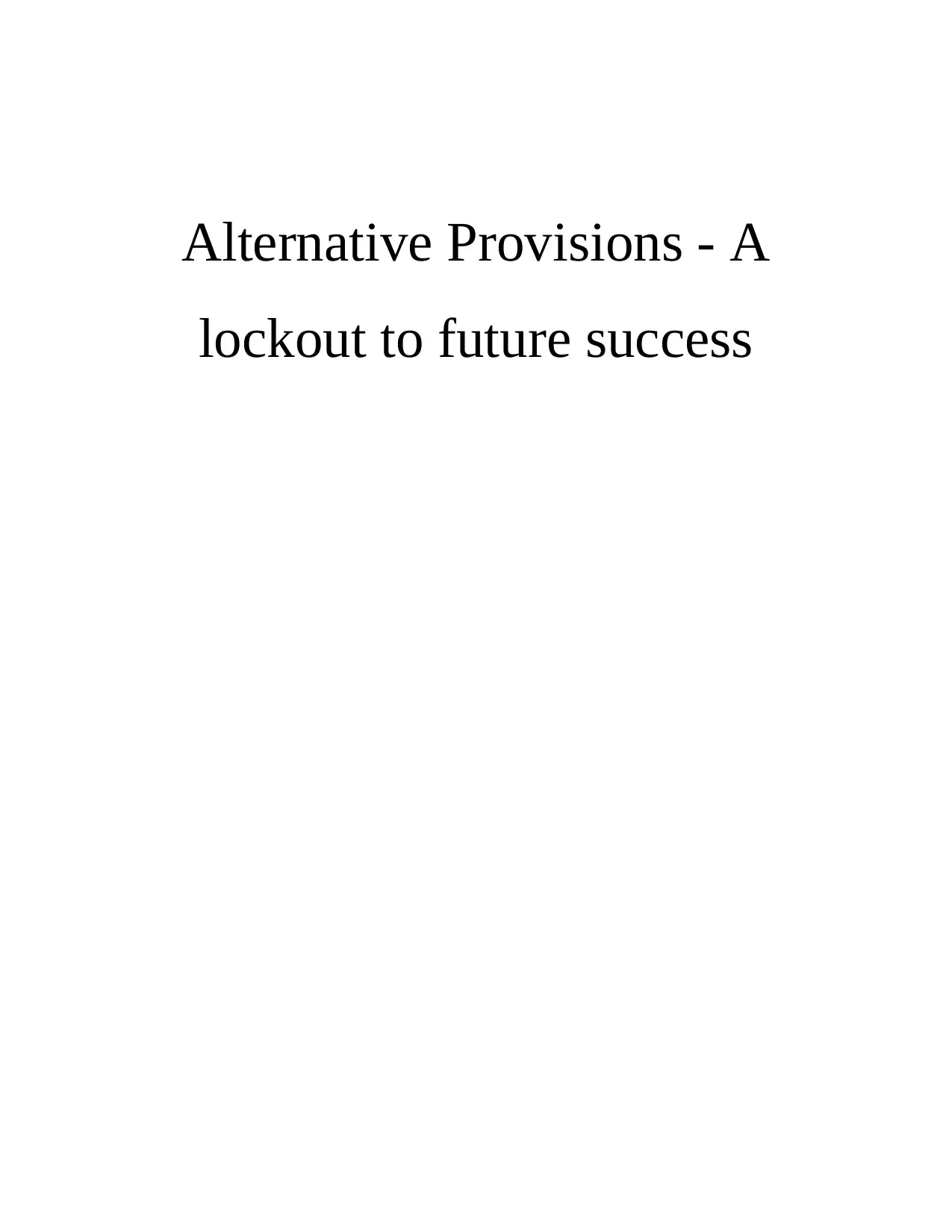
Alternative Provisions - A
lockout to future success
lockout to future success
Paraphrase This Document
Need a fresh take? Get an instant paraphrase of this document with our AI Paraphraser
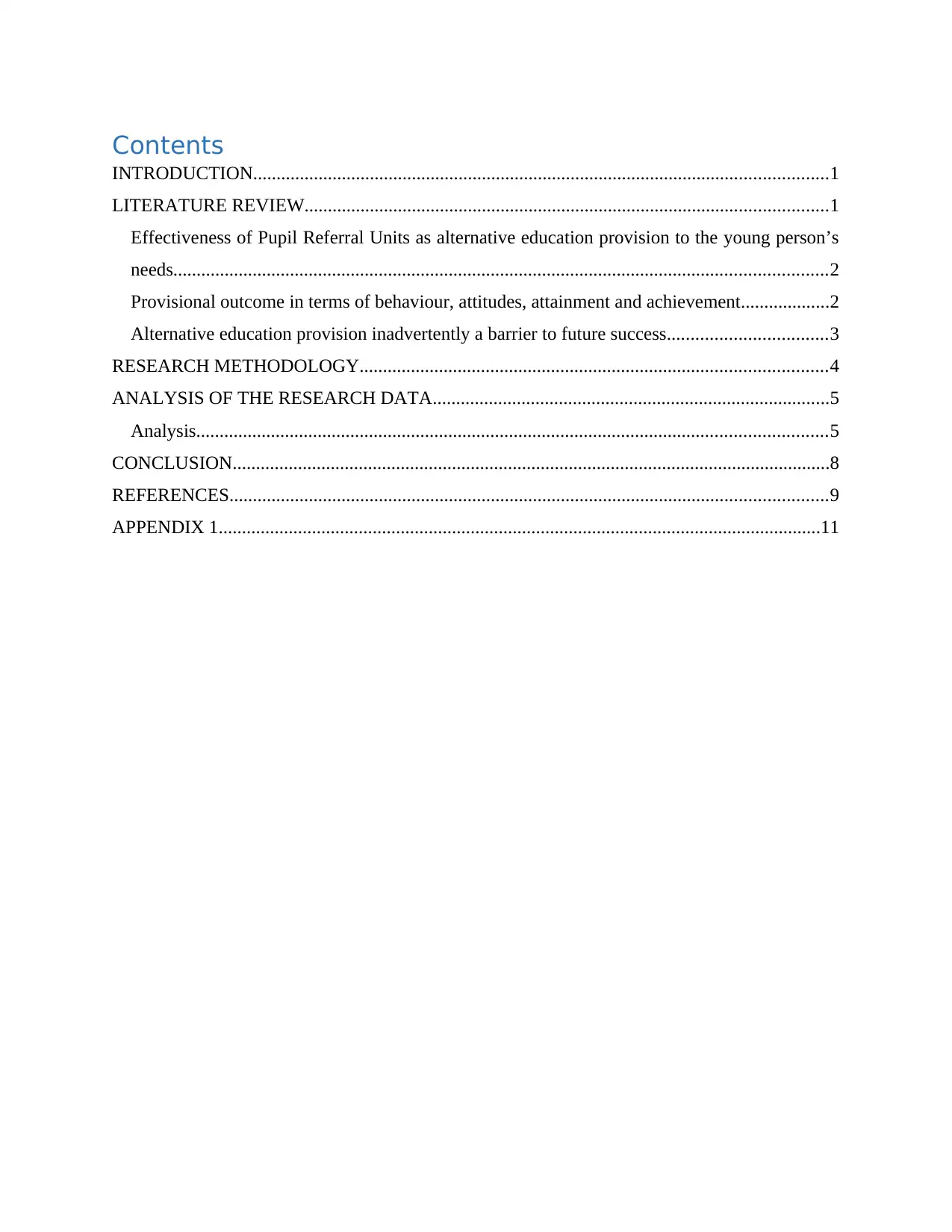
Contents
INTRODUCTION...........................................................................................................................1
LITERATURE REVIEW................................................................................................................1
Effectiveness of Pupil Referral Units as alternative education provision to the young person’s
needs............................................................................................................................................2
Provisional outcome in terms of behaviour, attitudes, attainment and achievement...................2
Alternative education provision inadvertently a barrier to future success..................................3
RESEARCH METHODOLOGY....................................................................................................4
ANALYSIS OF THE RESEARCH DATA.....................................................................................5
Analysis.......................................................................................................................................5
CONCLUSION................................................................................................................................8
REFERENCES................................................................................................................................9
APPENDIX 1.................................................................................................................................11
INTRODUCTION...........................................................................................................................1
LITERATURE REVIEW................................................................................................................1
Effectiveness of Pupil Referral Units as alternative education provision to the young person’s
needs............................................................................................................................................2
Provisional outcome in terms of behaviour, attitudes, attainment and achievement...................2
Alternative education provision inadvertently a barrier to future success..................................3
RESEARCH METHODOLOGY....................................................................................................4
ANALYSIS OF THE RESEARCH DATA.....................................................................................5
Analysis.......................................................................................................................................5
CONCLUSION................................................................................................................................8
REFERENCES................................................................................................................................9
APPENDIX 1.................................................................................................................................11
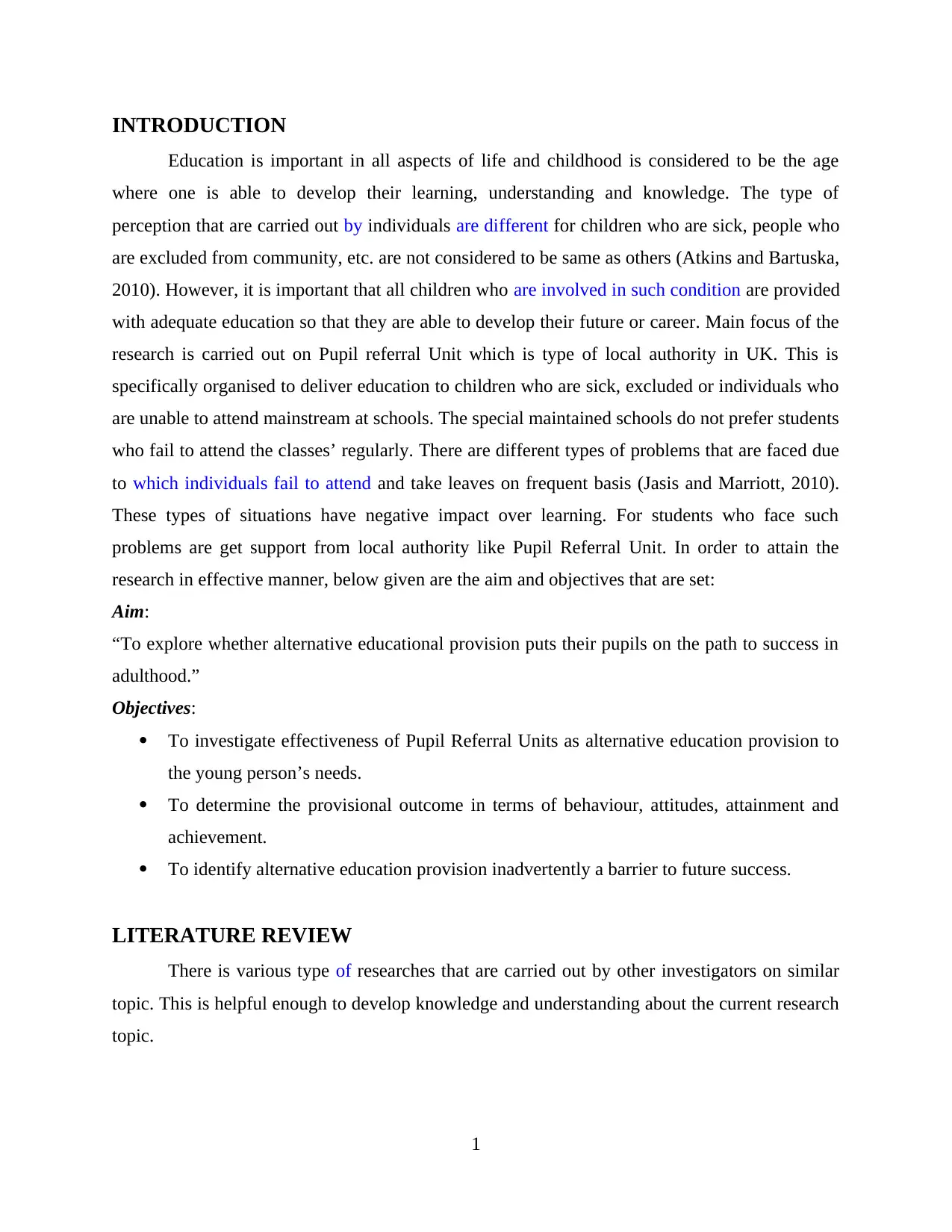
INTRODUCTION
Education is important in all aspects of life and childhood is considered to be the age
where one is able to develop their learning, understanding and knowledge. The type of
perception that are carried out by individuals are different for children who are sick, people who
are excluded from community, etc. are not considered to be same as others (Atkins and Bartuska,
2010). However, it is important that all children who are involved in such condition are provided
with adequate education so that they are able to develop their future or career. Main focus of the
research is carried out on Pupil referral Unit which is type of local authority in UK. This is
specifically organised to deliver education to children who are sick, excluded or individuals who
are unable to attend mainstream at schools. The special maintained schools do not prefer students
who fail to attend the classes’ regularly. There are different types of problems that are faced due
to which individuals fail to attend and take leaves on frequent basis (Jasis and Marriott, 2010).
These types of situations have negative impact over learning. For students who face such
problems are get support from local authority like Pupil Referral Unit. In order to attain the
research in effective manner, below given are the aim and objectives that are set:
Aim:
“To explore whether alternative educational provision puts their pupils on the path to success in
adulthood.”
Objectives:
To investigate effectiveness of Pupil Referral Units as alternative education provision to
the young person’s needs.
To determine the provisional outcome in terms of behaviour, attitudes, attainment and
achievement.
To identify alternative education provision inadvertently a barrier to future success.
LITERATURE REVIEW
There is various type of researches that are carried out by other investigators on similar
topic. This is helpful enough to develop knowledge and understanding about the current research
topic.
1
Education is important in all aspects of life and childhood is considered to be the age
where one is able to develop their learning, understanding and knowledge. The type of
perception that are carried out by individuals are different for children who are sick, people who
are excluded from community, etc. are not considered to be same as others (Atkins and Bartuska,
2010). However, it is important that all children who are involved in such condition are provided
with adequate education so that they are able to develop their future or career. Main focus of the
research is carried out on Pupil referral Unit which is type of local authority in UK. This is
specifically organised to deliver education to children who are sick, excluded or individuals who
are unable to attend mainstream at schools. The special maintained schools do not prefer students
who fail to attend the classes’ regularly. There are different types of problems that are faced due
to which individuals fail to attend and take leaves on frequent basis (Jasis and Marriott, 2010).
These types of situations have negative impact over learning. For students who face such
problems are get support from local authority like Pupil Referral Unit. In order to attain the
research in effective manner, below given are the aim and objectives that are set:
Aim:
“To explore whether alternative educational provision puts their pupils on the path to success in
adulthood.”
Objectives:
To investigate effectiveness of Pupil Referral Units as alternative education provision to
the young person’s needs.
To determine the provisional outcome in terms of behaviour, attitudes, attainment and
achievement.
To identify alternative education provision inadvertently a barrier to future success.
LITERATURE REVIEW
There is various type of researches that are carried out by other investigators on similar
topic. This is helpful enough to develop knowledge and understanding about the current research
topic.
1
⊘ This is a preview!⊘
Do you want full access?
Subscribe today to unlock all pages.

Trusted by 1+ million students worldwide
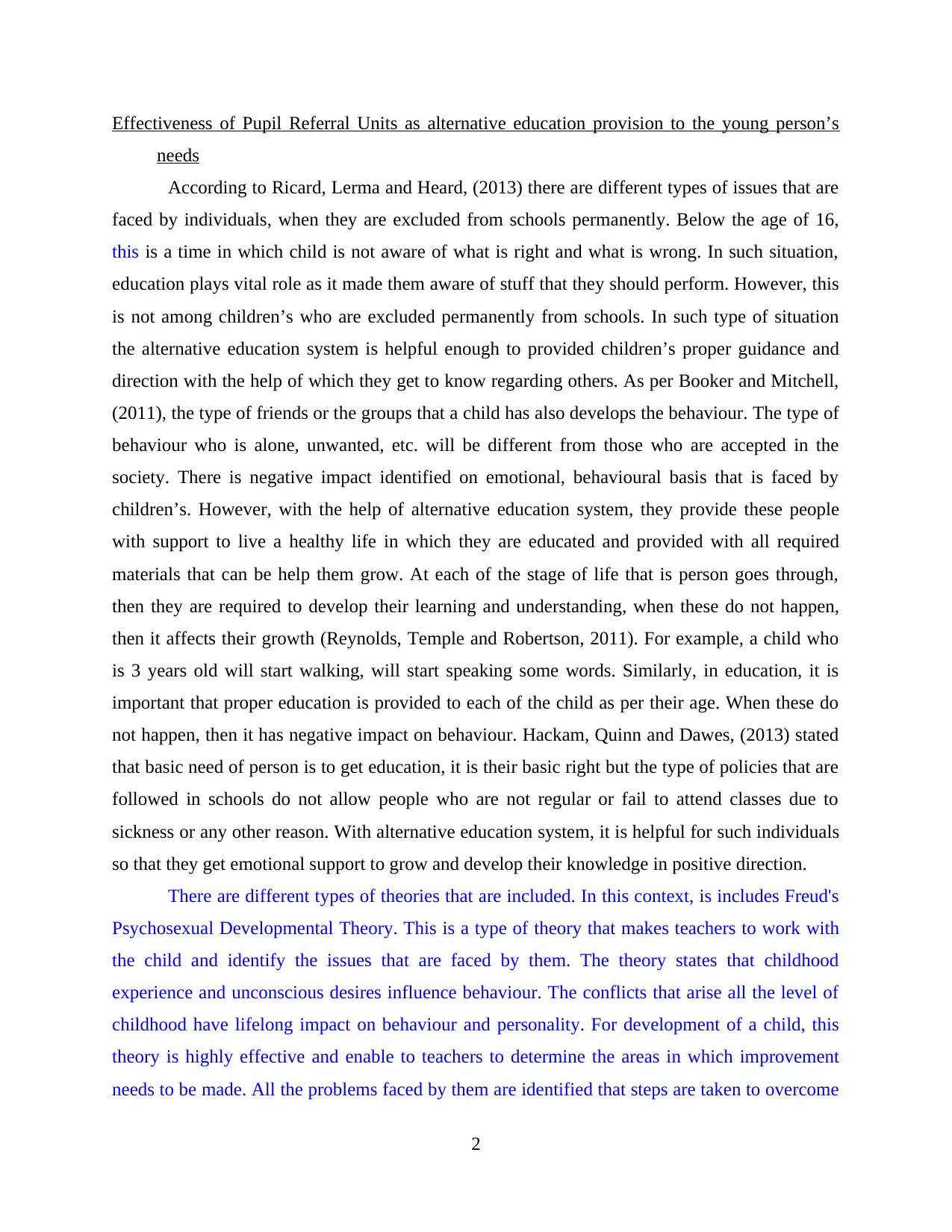
Effectiveness of Pupil Referral Units as alternative education provision to the young person’s
needs
According to Ricard, Lerma and Heard, (2013) there are different types of issues that are
faced by individuals, when they are excluded from schools permanently. Below the age of 16,
this is a time in which child is not aware of what is right and what is wrong. In such situation,
education plays vital role as it made them aware of stuff that they should perform. However, this
is not among children’s who are excluded permanently from schools. In such type of situation
the alternative education system is helpful enough to provided children’s proper guidance and
direction with the help of which they get to know regarding others. As per Booker and Mitchell,
(2011), the type of friends or the groups that a child has also develops the behaviour. The type of
behaviour who is alone, unwanted, etc. will be different from those who are accepted in the
society. There is negative impact identified on emotional, behavioural basis that is faced by
children’s. However, with the help of alternative education system, they provide these people
with support to live a healthy life in which they are educated and provided with all required
materials that can be help them grow. At each of the stage of life that is person goes through,
then they are required to develop their learning and understanding, when these do not happen,
then it affects their growth (Reynolds, Temple and Robertson, 2011). For example, a child who
is 3 years old will start walking, will start speaking some words. Similarly, in education, it is
important that proper education is provided to each of the child as per their age. When these do
not happen, then it has negative impact on behaviour. Hackam, Quinn and Dawes, (2013) stated
that basic need of person is to get education, it is their basic right but the type of policies that are
followed in schools do not allow people who are not regular or fail to attend classes due to
sickness or any other reason. With alternative education system, it is helpful for such individuals
so that they get emotional support to grow and develop their knowledge in positive direction.
There are different types of theories that are included. In this context, is includes Freud's
Psychosexual Developmental Theory. This is a type of theory that makes teachers to work with
the child and identify the issues that are faced by them. The theory states that childhood
experience and unconscious desires influence behaviour. The conflicts that arise all the level of
childhood have lifelong impact on behaviour and personality. For development of a child, this
theory is highly effective and enable to teachers to determine the areas in which improvement
needs to be made. All the problems faced by them are identified that steps are taken to overcome
2
needs
According to Ricard, Lerma and Heard, (2013) there are different types of issues that are
faced by individuals, when they are excluded from schools permanently. Below the age of 16,
this is a time in which child is not aware of what is right and what is wrong. In such situation,
education plays vital role as it made them aware of stuff that they should perform. However, this
is not among children’s who are excluded permanently from schools. In such type of situation
the alternative education system is helpful enough to provided children’s proper guidance and
direction with the help of which they get to know regarding others. As per Booker and Mitchell,
(2011), the type of friends or the groups that a child has also develops the behaviour. The type of
behaviour who is alone, unwanted, etc. will be different from those who are accepted in the
society. There is negative impact identified on emotional, behavioural basis that is faced by
children’s. However, with the help of alternative education system, they provide these people
with support to live a healthy life in which they are educated and provided with all required
materials that can be help them grow. At each of the stage of life that is person goes through,
then they are required to develop their learning and understanding, when these do not happen,
then it affects their growth (Reynolds, Temple and Robertson, 2011). For example, a child who
is 3 years old will start walking, will start speaking some words. Similarly, in education, it is
important that proper education is provided to each of the child as per their age. When these do
not happen, then it has negative impact on behaviour. Hackam, Quinn and Dawes, (2013) stated
that basic need of person is to get education, it is their basic right but the type of policies that are
followed in schools do not allow people who are not regular or fail to attend classes due to
sickness or any other reason. With alternative education system, it is helpful for such individuals
so that they get emotional support to grow and develop their knowledge in positive direction.
There are different types of theories that are included. In this context, is includes Freud's
Psychosexual Developmental Theory. This is a type of theory that makes teachers to work with
the child and identify the issues that are faced by them. The theory states that childhood
experience and unconscious desires influence behaviour. The conflicts that arise all the level of
childhood have lifelong impact on behaviour and personality. For development of a child, this
theory is highly effective and enable to teachers to determine the areas in which improvement
needs to be made. All the problems faced by them are identified that steps are taken to overcome
2
Paraphrase This Document
Need a fresh take? Get an instant paraphrase of this document with our AI Paraphraser
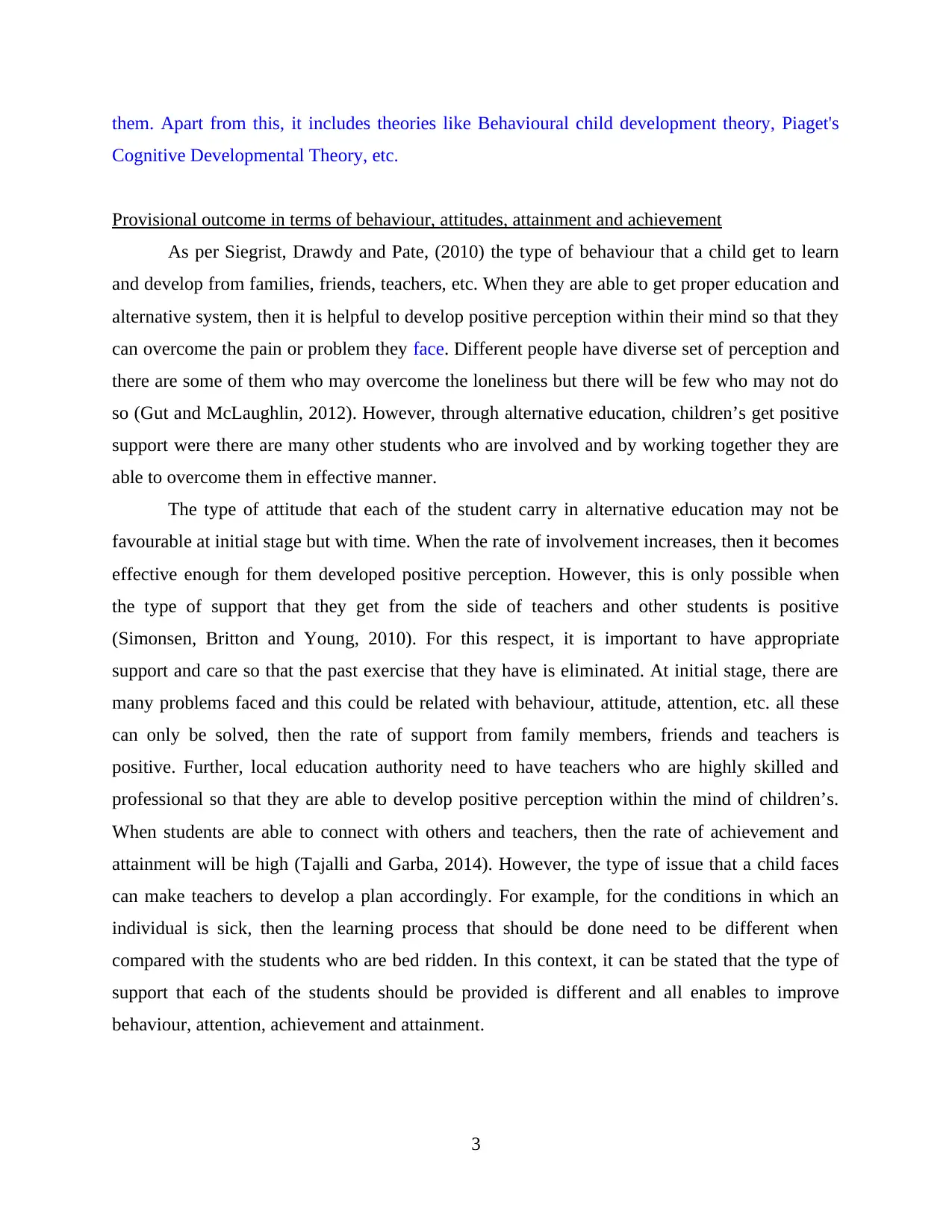
them. Apart from this, it includes theories like Behavioural child development theory, Piaget's
Cognitive Developmental Theory, etc.
Provisional outcome in terms of behaviour, attitudes, attainment and achievement
As per Siegrist, Drawdy and Pate, (2010) the type of behaviour that a child get to learn
and develop from families, friends, teachers, etc. When they are able to get proper education and
alternative system, then it is helpful to develop positive perception within their mind so that they
can overcome the pain or problem they face. Different people have diverse set of perception and
there are some of them who may overcome the loneliness but there will be few who may not do
so (Gut and McLaughlin, 2012). However, through alternative education, children’s get positive
support were there are many other students who are involved and by working together they are
able to overcome them in effective manner.
The type of attitude that each of the student carry in alternative education may not be
favourable at initial stage but with time. When the rate of involvement increases, then it becomes
effective enough for them developed positive perception. However, this is only possible when
the type of support that they get from the side of teachers and other students is positive
(Simonsen, Britton and Young, 2010). For this respect, it is important to have appropriate
support and care so that the past exercise that they have is eliminated. At initial stage, there are
many problems faced and this could be related with behaviour, attitude, attention, etc. all these
can only be solved, then the rate of support from family members, friends and teachers is
positive. Further, local education authority need to have teachers who are highly skilled and
professional so that they are able to develop positive perception within the mind of children’s.
When students are able to connect with others and teachers, then the rate of achievement and
attainment will be high (Tajalli and Garba, 2014). However, the type of issue that a child faces
can make teachers to develop a plan accordingly. For example, for the conditions in which an
individual is sick, then the learning process that should be done need to be different when
compared with the students who are bed ridden. In this context, it can be stated that the type of
support that each of the students should be provided is different and all enables to improve
behaviour, attention, achievement and attainment.
3
Cognitive Developmental Theory, etc.
Provisional outcome in terms of behaviour, attitudes, attainment and achievement
As per Siegrist, Drawdy and Pate, (2010) the type of behaviour that a child get to learn
and develop from families, friends, teachers, etc. When they are able to get proper education and
alternative system, then it is helpful to develop positive perception within their mind so that they
can overcome the pain or problem they face. Different people have diverse set of perception and
there are some of them who may overcome the loneliness but there will be few who may not do
so (Gut and McLaughlin, 2012). However, through alternative education, children’s get positive
support were there are many other students who are involved and by working together they are
able to overcome them in effective manner.
The type of attitude that each of the student carry in alternative education may not be
favourable at initial stage but with time. When the rate of involvement increases, then it becomes
effective enough for them developed positive perception. However, this is only possible when
the type of support that they get from the side of teachers and other students is positive
(Simonsen, Britton and Young, 2010). For this respect, it is important to have appropriate
support and care so that the past exercise that they have is eliminated. At initial stage, there are
many problems faced and this could be related with behaviour, attitude, attention, etc. all these
can only be solved, then the rate of support from family members, friends and teachers is
positive. Further, local education authority need to have teachers who are highly skilled and
professional so that they are able to develop positive perception within the mind of children’s.
When students are able to connect with others and teachers, then the rate of achievement and
attainment will be high (Tajalli and Garba, 2014). However, the type of issue that a child faces
can make teachers to develop a plan accordingly. For example, for the conditions in which an
individual is sick, then the learning process that should be done need to be different when
compared with the students who are bed ridden. In this context, it can be stated that the type of
support that each of the students should be provided is different and all enables to improve
behaviour, attention, achievement and attainment.
3
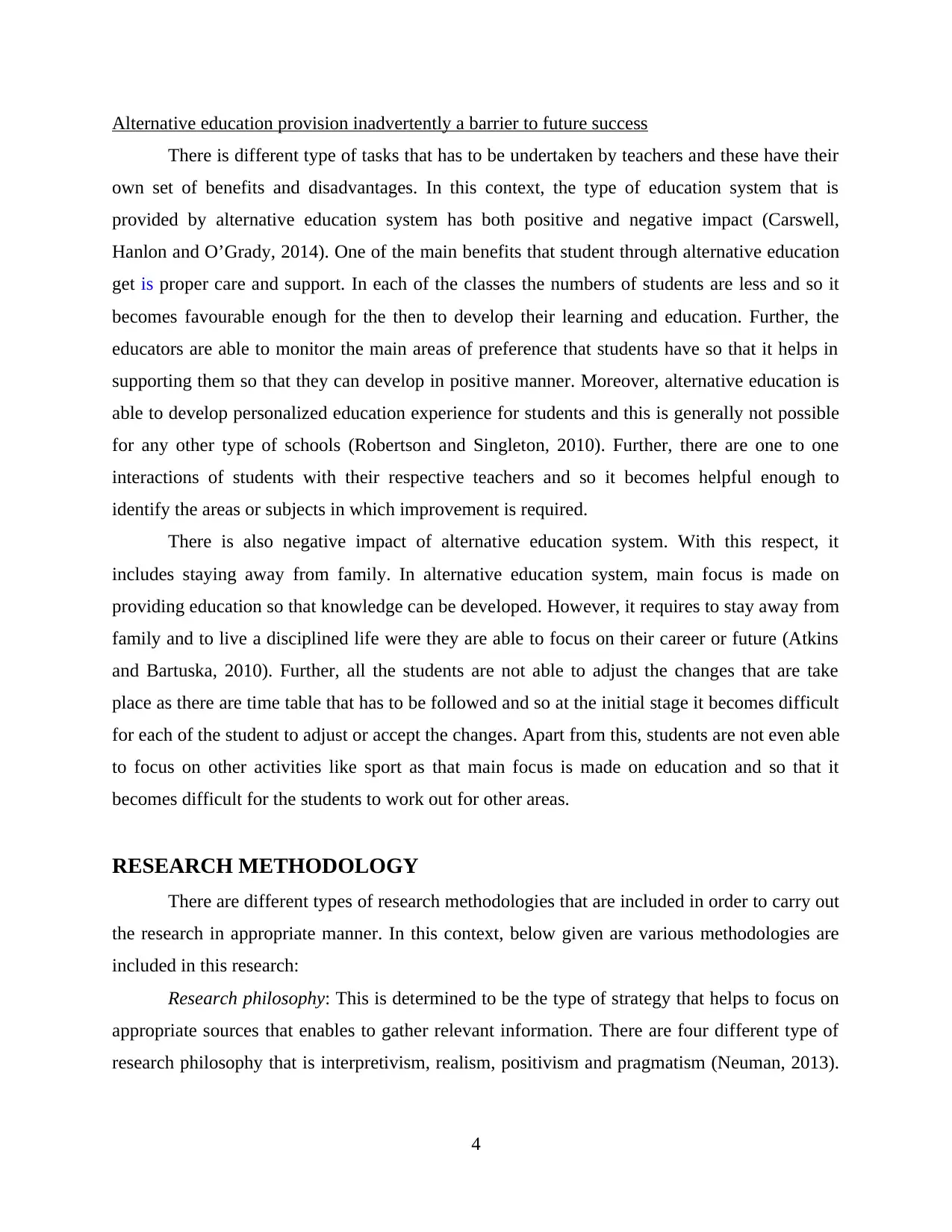
Alternative education provision inadvertently a barrier to future success
There is different type of tasks that has to be undertaken by teachers and these have their
own set of benefits and disadvantages. In this context, the type of education system that is
provided by alternative education system has both positive and negative impact (Carswell,
Hanlon and O’Grady, 2014). One of the main benefits that student through alternative education
get is proper care and support. In each of the classes the numbers of students are less and so it
becomes favourable enough for the then to develop their learning and education. Further, the
educators are able to monitor the main areas of preference that students have so that it helps in
supporting them so that they can develop in positive manner. Moreover, alternative education is
able to develop personalized education experience for students and this is generally not possible
for any other type of schools (Robertson and Singleton, 2010). Further, there are one to one
interactions of students with their respective teachers and so it becomes helpful enough to
identify the areas or subjects in which improvement is required.
There is also negative impact of alternative education system. With this respect, it
includes staying away from family. In alternative education system, main focus is made on
providing education so that knowledge can be developed. However, it requires to stay away from
family and to live a disciplined life were they are able to focus on their career or future (Atkins
and Bartuska, 2010). Further, all the students are not able to adjust the changes that are take
place as there are time table that has to be followed and so at the initial stage it becomes difficult
for each of the student to adjust or accept the changes. Apart from this, students are not even able
to focus on other activities like sport as that main focus is made on education and so that it
becomes difficult for the students to work out for other areas.
RESEARCH METHODOLOGY
There are different types of research methodologies that are included in order to carry out
the research in appropriate manner. In this context, below given are various methodologies are
included in this research:
Research philosophy: This is determined to be the type of strategy that helps to focus on
appropriate sources that enables to gather relevant information. There are four different type of
research philosophy that is interpretivism, realism, positivism and pragmatism (Neuman, 2013).
4
There is different type of tasks that has to be undertaken by teachers and these have their
own set of benefits and disadvantages. In this context, the type of education system that is
provided by alternative education system has both positive and negative impact (Carswell,
Hanlon and O’Grady, 2014). One of the main benefits that student through alternative education
get is proper care and support. In each of the classes the numbers of students are less and so it
becomes favourable enough for the then to develop their learning and education. Further, the
educators are able to monitor the main areas of preference that students have so that it helps in
supporting them so that they can develop in positive manner. Moreover, alternative education is
able to develop personalized education experience for students and this is generally not possible
for any other type of schools (Robertson and Singleton, 2010). Further, there are one to one
interactions of students with their respective teachers and so it becomes helpful enough to
identify the areas or subjects in which improvement is required.
There is also negative impact of alternative education system. With this respect, it
includes staying away from family. In alternative education system, main focus is made on
providing education so that knowledge can be developed. However, it requires to stay away from
family and to live a disciplined life were they are able to focus on their career or future (Atkins
and Bartuska, 2010). Further, all the students are not able to adjust the changes that are take
place as there are time table that has to be followed and so at the initial stage it becomes difficult
for each of the student to adjust or accept the changes. Apart from this, students are not even able
to focus on other activities like sport as that main focus is made on education and so that it
becomes difficult for the students to work out for other areas.
RESEARCH METHODOLOGY
There are different types of research methodologies that are included in order to carry out
the research in appropriate manner. In this context, below given are various methodologies are
included in this research:
Research philosophy: This is determined to be the type of strategy that helps to focus on
appropriate sources that enables to gather relevant information. There are four different type of
research philosophy that is interpretivism, realism, positivism and pragmatism (Neuman, 2013).
4
⊘ This is a preview!⊘
Do you want full access?
Subscribe today to unlock all pages.

Trusted by 1+ million students worldwide
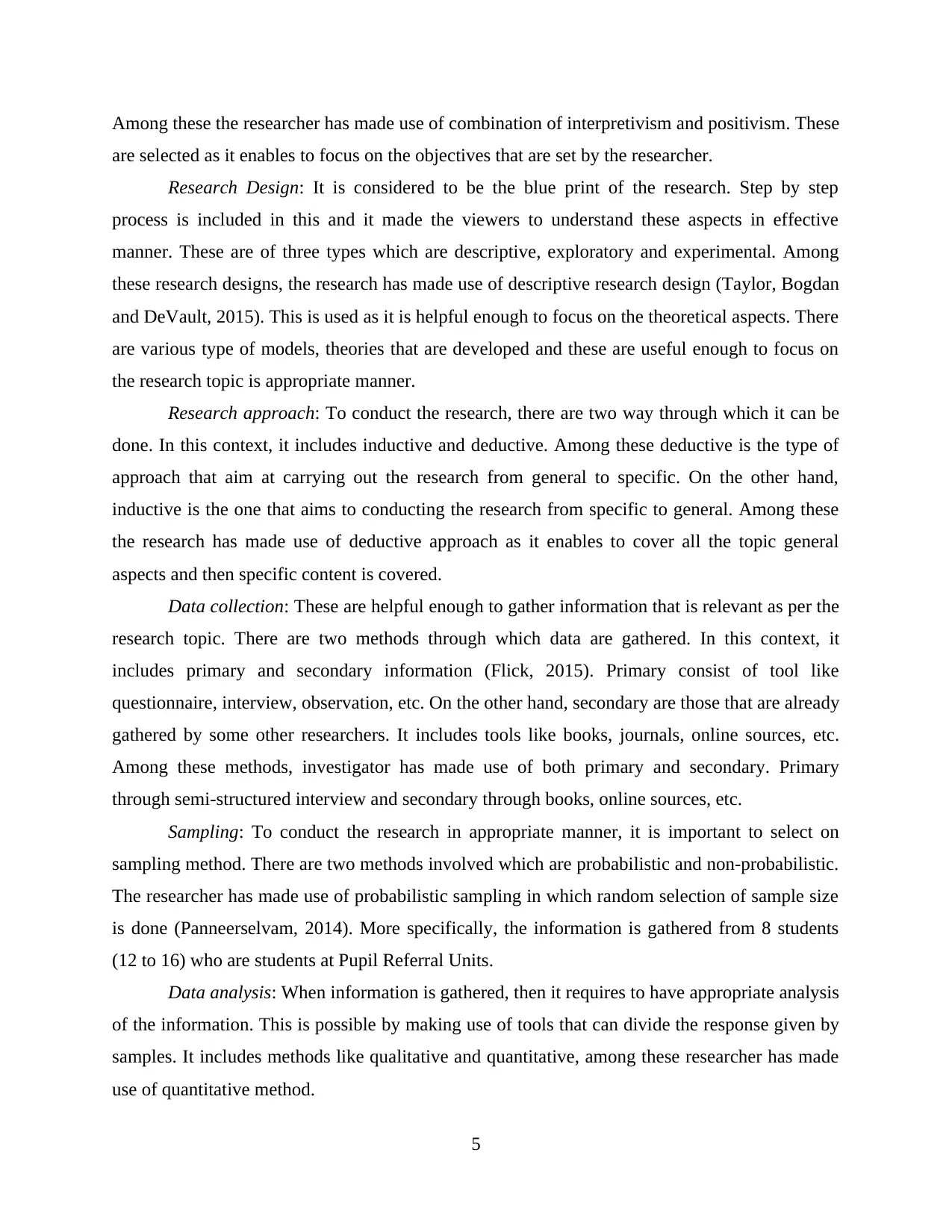
Among these the researcher has made use of combination of interpretivism and positivism. These
are selected as it enables to focus on the objectives that are set by the researcher.
Research Design: It is considered to be the blue print of the research. Step by step
process is included in this and it made the viewers to understand these aspects in effective
manner. These are of three types which are descriptive, exploratory and experimental. Among
these research designs, the research has made use of descriptive research design (Taylor, Bogdan
and DeVault, 2015). This is used as it is helpful enough to focus on the theoretical aspects. There
are various type of models, theories that are developed and these are useful enough to focus on
the research topic is appropriate manner.
Research approach: To conduct the research, there are two way through which it can be
done. In this context, it includes inductive and deductive. Among these deductive is the type of
approach that aim at carrying out the research from general to specific. On the other hand,
inductive is the one that aims to conducting the research from specific to general. Among these
the research has made use of deductive approach as it enables to cover all the topic general
aspects and then specific content is covered.
Data collection: These are helpful enough to gather information that is relevant as per the
research topic. There are two methods through which data are gathered. In this context, it
includes primary and secondary information (Flick, 2015). Primary consist of tool like
questionnaire, interview, observation, etc. On the other hand, secondary are those that are already
gathered by some other researchers. It includes tools like books, journals, online sources, etc.
Among these methods, investigator has made use of both primary and secondary. Primary
through semi-structured interview and secondary through books, online sources, etc.
Sampling: To conduct the research in appropriate manner, it is important to select on
sampling method. There are two methods involved which are probabilistic and non-probabilistic.
The researcher has made use of probabilistic sampling in which random selection of sample size
is done (Panneerselvam, 2014). More specifically, the information is gathered from 8 students
(12 to 16) who are students at Pupil Referral Units.
Data analysis: When information is gathered, then it requires to have appropriate analysis
of the information. This is possible by making use of tools that can divide the response given by
samples. It includes methods like qualitative and quantitative, among these researcher has made
use of quantitative method.
5
are selected as it enables to focus on the objectives that are set by the researcher.
Research Design: It is considered to be the blue print of the research. Step by step
process is included in this and it made the viewers to understand these aspects in effective
manner. These are of three types which are descriptive, exploratory and experimental. Among
these research designs, the research has made use of descriptive research design (Taylor, Bogdan
and DeVault, 2015). This is used as it is helpful enough to focus on the theoretical aspects. There
are various type of models, theories that are developed and these are useful enough to focus on
the research topic is appropriate manner.
Research approach: To conduct the research, there are two way through which it can be
done. In this context, it includes inductive and deductive. Among these deductive is the type of
approach that aim at carrying out the research from general to specific. On the other hand,
inductive is the one that aims to conducting the research from specific to general. Among these
the research has made use of deductive approach as it enables to cover all the topic general
aspects and then specific content is covered.
Data collection: These are helpful enough to gather information that is relevant as per the
research topic. There are two methods through which data are gathered. In this context, it
includes primary and secondary information (Flick, 2015). Primary consist of tool like
questionnaire, interview, observation, etc. On the other hand, secondary are those that are already
gathered by some other researchers. It includes tools like books, journals, online sources, etc.
Among these methods, investigator has made use of both primary and secondary. Primary
through semi-structured interview and secondary through books, online sources, etc.
Sampling: To conduct the research in appropriate manner, it is important to select on
sampling method. There are two methods involved which are probabilistic and non-probabilistic.
The researcher has made use of probabilistic sampling in which random selection of sample size
is done (Panneerselvam, 2014). More specifically, the information is gathered from 8 students
(12 to 16) who are students at Pupil Referral Units.
Data analysis: When information is gathered, then it requires to have appropriate analysis
of the information. This is possible by making use of tools that can divide the response given by
samples. It includes methods like qualitative and quantitative, among these researcher has made
use of quantitative method.
5
Paraphrase This Document
Need a fresh take? Get an instant paraphrase of this document with our AI Paraphraser
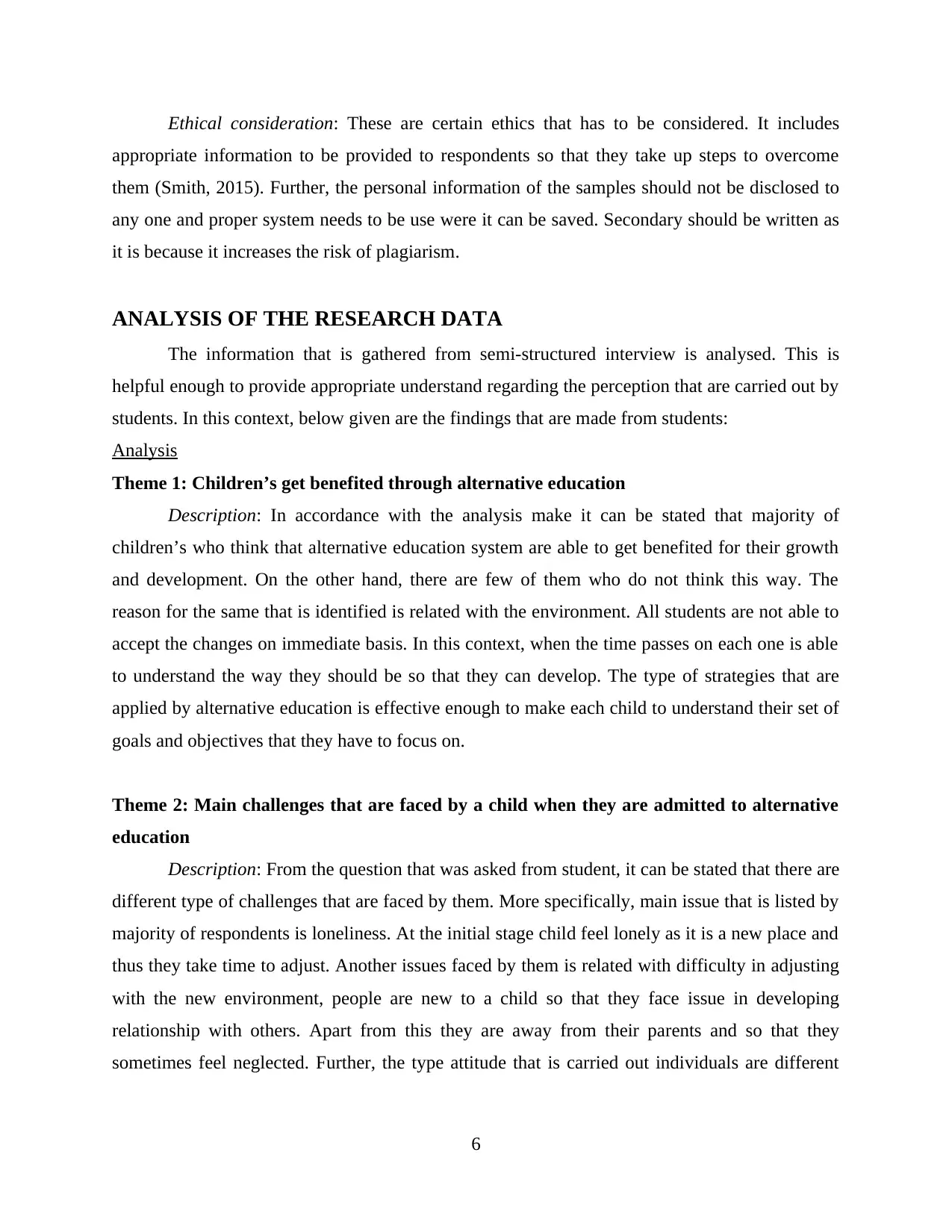
Ethical consideration: These are certain ethics that has to be considered. It includes
appropriate information to be provided to respondents so that they take up steps to overcome
them (Smith, 2015). Further, the personal information of the samples should not be disclosed to
any one and proper system needs to be use were it can be saved. Secondary should be written as
it is because it increases the risk of plagiarism.
ANALYSIS OF THE RESEARCH DATA
The information that is gathered from semi-structured interview is analysed. This is
helpful enough to provide appropriate understand regarding the perception that are carried out by
students. In this context, below given are the findings that are made from students:
Analysis
Theme 1: Children’s get benefited through alternative education
Description: In accordance with the analysis make it can be stated that majority of
children’s who think that alternative education system are able to get benefited for their growth
and development. On the other hand, there are few of them who do not think this way. The
reason for the same that is identified is related with the environment. All students are not able to
accept the changes on immediate basis. In this context, when the time passes on each one is able
to understand the way they should be so that they can develop. The type of strategies that are
applied by alternative education is effective enough to make each child to understand their set of
goals and objectives that they have to focus on.
Theme 2: Main challenges that are faced by a child when they are admitted to alternative
education
Description: From the question that was asked from student, it can be stated that there are
different type of challenges that are faced by them. More specifically, main issue that is listed by
majority of respondents is loneliness. At the initial stage child feel lonely as it is a new place and
thus they take time to adjust. Another issues faced by them is related with difficulty in adjusting
with the new environment, people are new to a child so that they face issue in developing
relationship with others. Apart from this they are away from their parents and so that they
sometimes feel neglected. Further, the type attitude that is carried out individuals are different
6
appropriate information to be provided to respondents so that they take up steps to overcome
them (Smith, 2015). Further, the personal information of the samples should not be disclosed to
any one and proper system needs to be use were it can be saved. Secondary should be written as
it is because it increases the risk of plagiarism.
ANALYSIS OF THE RESEARCH DATA
The information that is gathered from semi-structured interview is analysed. This is
helpful enough to provide appropriate understand regarding the perception that are carried out by
students. In this context, below given are the findings that are made from students:
Analysis
Theme 1: Children’s get benefited through alternative education
Description: In accordance with the analysis make it can be stated that majority of
children’s who think that alternative education system are able to get benefited for their growth
and development. On the other hand, there are few of them who do not think this way. The
reason for the same that is identified is related with the environment. All students are not able to
accept the changes on immediate basis. In this context, when the time passes on each one is able
to understand the way they should be so that they can develop. The type of strategies that are
applied by alternative education is effective enough to make each child to understand their set of
goals and objectives that they have to focus on.
Theme 2: Main challenges that are faced by a child when they are admitted to alternative
education
Description: From the question that was asked from student, it can be stated that there are
different type of challenges that are faced by them. More specifically, main issue that is listed by
majority of respondents is loneliness. At the initial stage child feel lonely as it is a new place and
thus they take time to adjust. Another issues faced by them is related with difficulty in adjusting
with the new environment, people are new to a child so that they face issue in developing
relationship with others. Apart from this they are away from their parents and so that they
sometimes feel neglected. Further, the type attitude that is carried out individuals are different
6
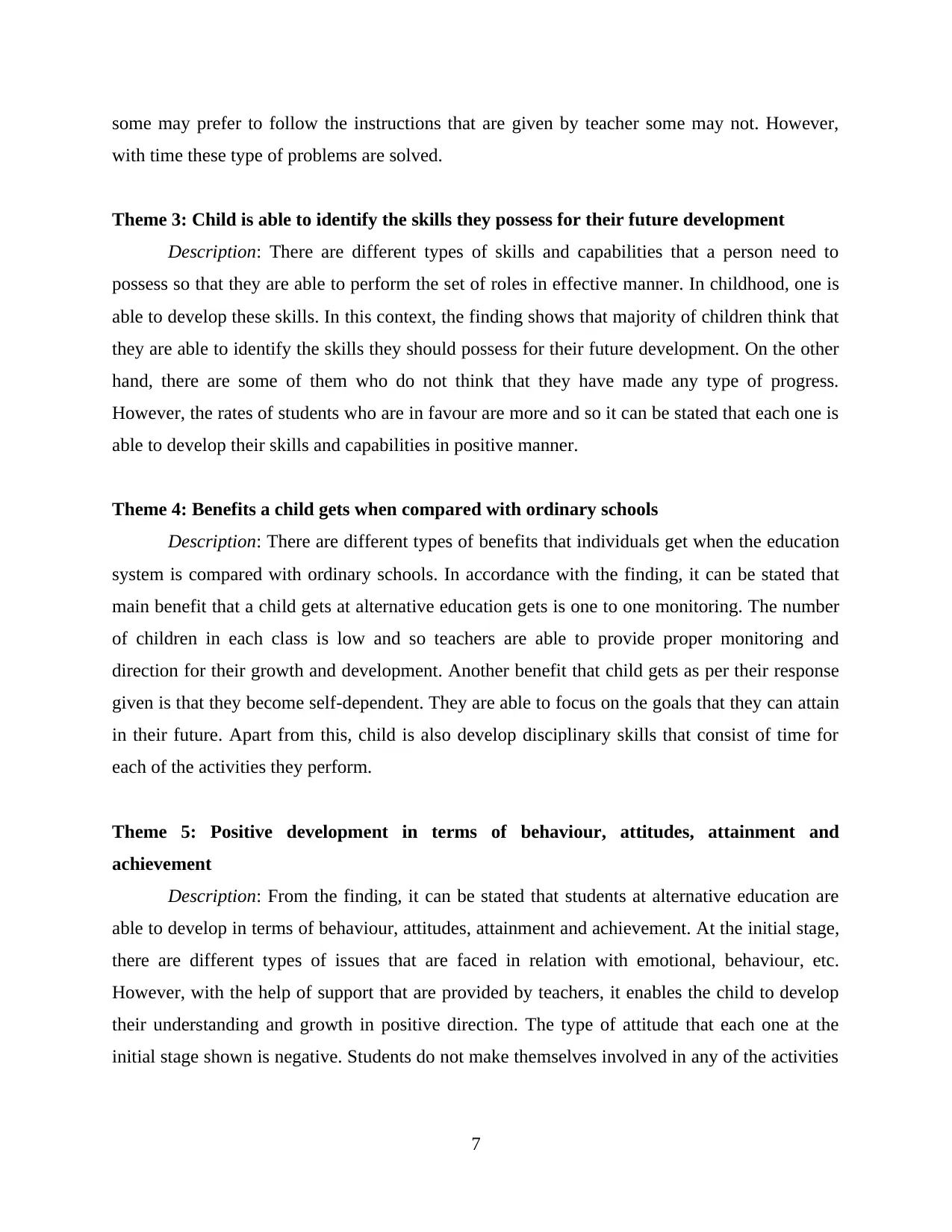
some may prefer to follow the instructions that are given by teacher some may not. However,
with time these type of problems are solved.
Theme 3: Child is able to identify the skills they possess for their future development
Description: There are different types of skills and capabilities that a person need to
possess so that they are able to perform the set of roles in effective manner. In childhood, one is
able to develop these skills. In this context, the finding shows that majority of children think that
they are able to identify the skills they should possess for their future development. On the other
hand, there are some of them who do not think that they have made any type of progress.
However, the rates of students who are in favour are more and so it can be stated that each one is
able to develop their skills and capabilities in positive manner.
Theme 4: Benefits a child gets when compared with ordinary schools
Description: There are different types of benefits that individuals get when the education
system is compared with ordinary schools. In accordance with the finding, it can be stated that
main benefit that a child gets at alternative education gets is one to one monitoring. The number
of children in each class is low and so teachers are able to provide proper monitoring and
direction for their growth and development. Another benefit that child gets as per their response
given is that they become self-dependent. They are able to focus on the goals that they can attain
in their future. Apart from this, child is also develop disciplinary skills that consist of time for
each of the activities they perform.
Theme 5: Positive development in terms of behaviour, attitudes, attainment and
achievement
Description: From the finding, it can be stated that students at alternative education are
able to develop in terms of behaviour, attitudes, attainment and achievement. At the initial stage,
there are different types of issues that are faced in relation with emotional, behaviour, etc.
However, with the help of support that are provided by teachers, it enables the child to develop
their understanding and growth in positive direction. The type of attitude that each one at the
initial stage shown is negative. Students do not make themselves involved in any of the activities
7
with time these type of problems are solved.
Theme 3: Child is able to identify the skills they possess for their future development
Description: There are different types of skills and capabilities that a person need to
possess so that they are able to perform the set of roles in effective manner. In childhood, one is
able to develop these skills. In this context, the finding shows that majority of children think that
they are able to identify the skills they should possess for their future development. On the other
hand, there are some of them who do not think that they have made any type of progress.
However, the rates of students who are in favour are more and so it can be stated that each one is
able to develop their skills and capabilities in positive manner.
Theme 4: Benefits a child gets when compared with ordinary schools
Description: There are different types of benefits that individuals get when the education
system is compared with ordinary schools. In accordance with the finding, it can be stated that
main benefit that a child gets at alternative education gets is one to one monitoring. The number
of children in each class is low and so teachers are able to provide proper monitoring and
direction for their growth and development. Another benefit that child gets as per their response
given is that they become self-dependent. They are able to focus on the goals that they can attain
in their future. Apart from this, child is also develop disciplinary skills that consist of time for
each of the activities they perform.
Theme 5: Positive development in terms of behaviour, attitudes, attainment and
achievement
Description: From the finding, it can be stated that students at alternative education are
able to develop in terms of behaviour, attitudes, attainment and achievement. At the initial stage,
there are different types of issues that are faced in relation with emotional, behaviour, etc.
However, with the help of support that are provided by teachers, it enables the child to develop
their understanding and growth in positive direction. The type of attitude that each one at the
initial stage shown is negative. Students do not make themselves involved in any of the activities
7
⊘ This is a preview!⊘
Do you want full access?
Subscribe today to unlock all pages.

Trusted by 1+ million students worldwide
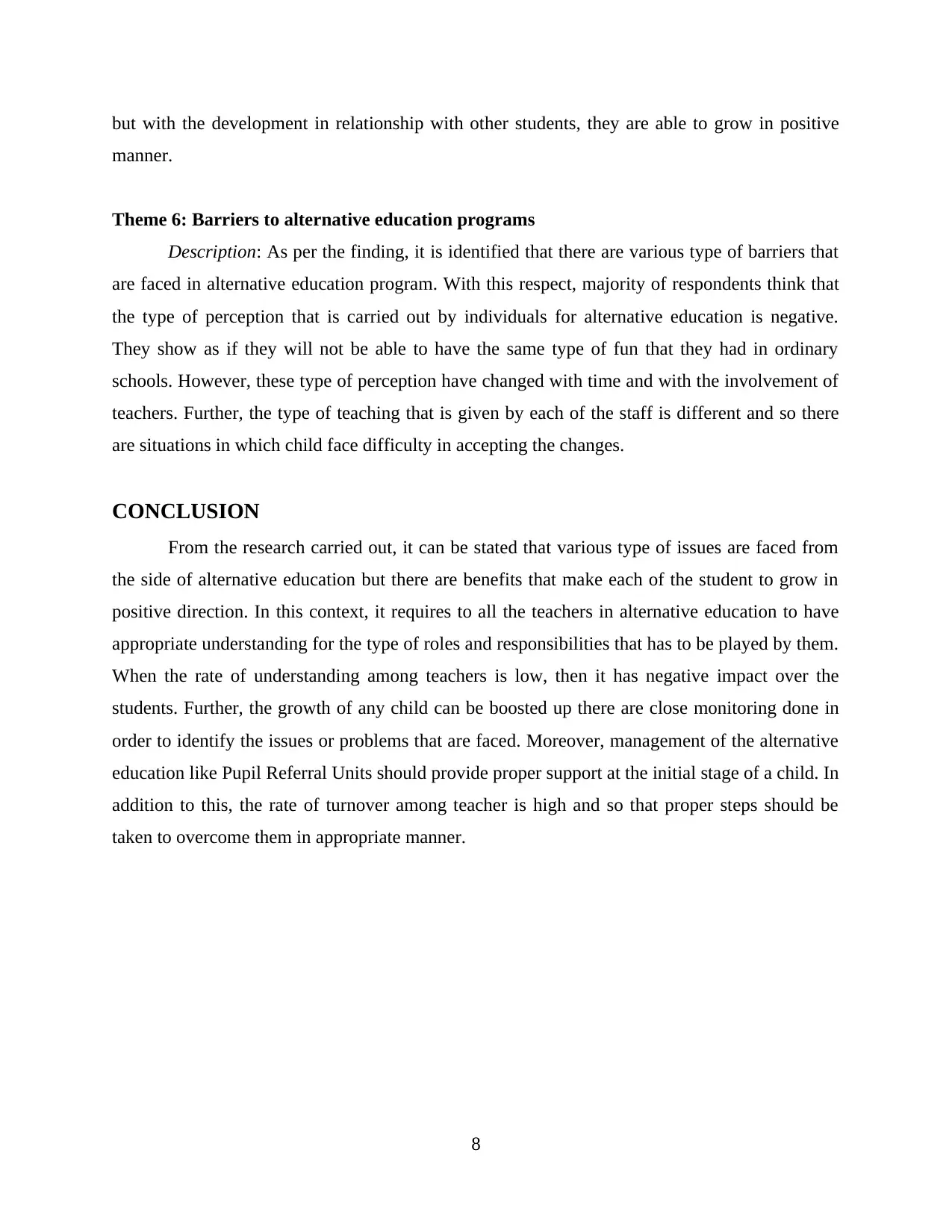
but with the development in relationship with other students, they are able to grow in positive
manner.
Theme 6: Barriers to alternative education programs
Description: As per the finding, it is identified that there are various type of barriers that
are faced in alternative education program. With this respect, majority of respondents think that
the type of perception that is carried out by individuals for alternative education is negative.
They show as if they will not be able to have the same type of fun that they had in ordinary
schools. However, these type of perception have changed with time and with the involvement of
teachers. Further, the type of teaching that is given by each of the staff is different and so there
are situations in which child face difficulty in accepting the changes.
CONCLUSION
From the research carried out, it can be stated that various type of issues are faced from
the side of alternative education but there are benefits that make each of the student to grow in
positive direction. In this context, it requires to all the teachers in alternative education to have
appropriate understanding for the type of roles and responsibilities that has to be played by them.
When the rate of understanding among teachers is low, then it has negative impact over the
students. Further, the growth of any child can be boosted up there are close monitoring done in
order to identify the issues or problems that are faced. Moreover, management of the alternative
education like Pupil Referral Units should provide proper support at the initial stage of a child. In
addition to this, the rate of turnover among teacher is high and so that proper steps should be
taken to overcome them in appropriate manner.
8
manner.
Theme 6: Barriers to alternative education programs
Description: As per the finding, it is identified that there are various type of barriers that
are faced in alternative education program. With this respect, majority of respondents think that
the type of perception that is carried out by individuals for alternative education is negative.
They show as if they will not be able to have the same type of fun that they had in ordinary
schools. However, these type of perception have changed with time and with the involvement of
teachers. Further, the type of teaching that is given by each of the staff is different and so there
are situations in which child face difficulty in accepting the changes.
CONCLUSION
From the research carried out, it can be stated that various type of issues are faced from
the side of alternative education but there are benefits that make each of the student to grow in
positive direction. In this context, it requires to all the teachers in alternative education to have
appropriate understanding for the type of roles and responsibilities that has to be played by them.
When the rate of understanding among teachers is low, then it has negative impact over the
students. Further, the growth of any child can be boosted up there are close monitoring done in
order to identify the issues or problems that are faced. Moreover, management of the alternative
education like Pupil Referral Units should provide proper support at the initial stage of a child. In
addition to this, the rate of turnover among teacher is high and so that proper steps should be
taken to overcome them in appropriate manner.
8
Paraphrase This Document
Need a fresh take? Get an instant paraphrase of this document with our AI Paraphraser
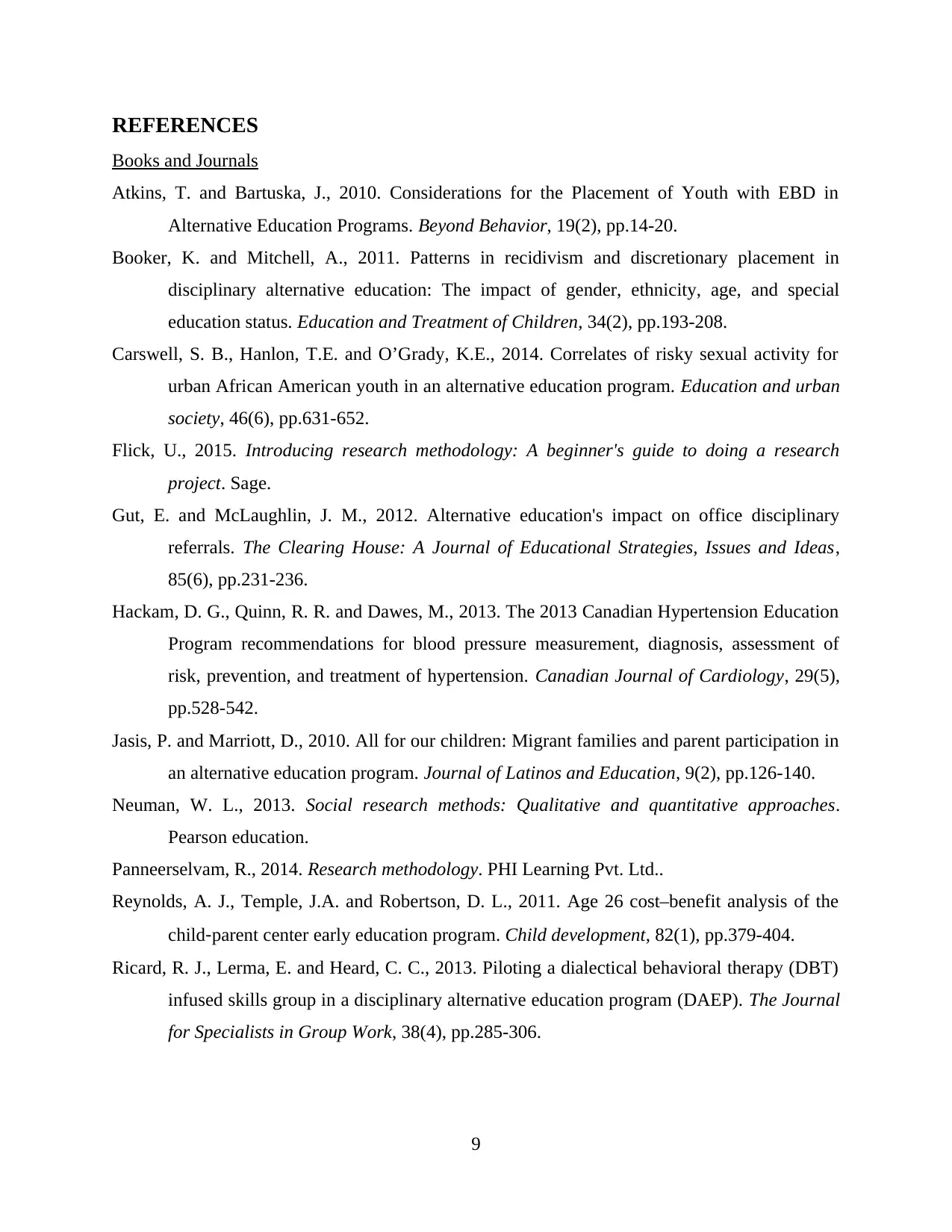
REFERENCES
Books and Journals
Atkins, T. and Bartuska, J., 2010. Considerations for the Placement of Youth with EBD in
Alternative Education Programs. Beyond Behavior, 19(2), pp.14-20.
Booker, K. and Mitchell, A., 2011. Patterns in recidivism and discretionary placement in
disciplinary alternative education: The impact of gender, ethnicity, age, and special
education status. Education and Treatment of Children, 34(2), pp.193-208.
Carswell, S. B., Hanlon, T.E. and O’Grady, K.E., 2014. Correlates of risky sexual activity for
urban African American youth in an alternative education program. Education and urban
society, 46(6), pp.631-652.
Flick, U., 2015. Introducing research methodology: A beginner's guide to doing a research
project. Sage.
Gut, E. and McLaughlin, J. M., 2012. Alternative education's impact on office disciplinary
referrals. The Clearing House: A Journal of Educational Strategies, Issues and Ideas,
85(6), pp.231-236.
Hackam, D. G., Quinn, R. R. and Dawes, M., 2013. The 2013 Canadian Hypertension Education
Program recommendations for blood pressure measurement, diagnosis, assessment of
risk, prevention, and treatment of hypertension. Canadian Journal of Cardiology, 29(5),
pp.528-542.
Jasis, P. and Marriott, D., 2010. All for our children: Migrant families and parent participation in
an alternative education program. Journal of Latinos and Education, 9(2), pp.126-140.
Neuman, W. L., 2013. Social research methods: Qualitative and quantitative approaches.
Pearson education.
Panneerselvam, R., 2014. Research methodology. PHI Learning Pvt. Ltd..
Reynolds, A. J., Temple, J.A. and Robertson, D. L., 2011. Age 26 cost–benefit analysis of the
child‐parent center early education program. Child development, 82(1), pp.379-404.
Ricard, R. J., Lerma, E. and Heard, C. C., 2013. Piloting a dialectical behavioral therapy (DBT)
infused skills group in a disciplinary alternative education program (DAEP). The Journal
for Specialists in Group Work, 38(4), pp.285-306.
9
Books and Journals
Atkins, T. and Bartuska, J., 2010. Considerations for the Placement of Youth with EBD in
Alternative Education Programs. Beyond Behavior, 19(2), pp.14-20.
Booker, K. and Mitchell, A., 2011. Patterns in recidivism and discretionary placement in
disciplinary alternative education: The impact of gender, ethnicity, age, and special
education status. Education and Treatment of Children, 34(2), pp.193-208.
Carswell, S. B., Hanlon, T.E. and O’Grady, K.E., 2014. Correlates of risky sexual activity for
urban African American youth in an alternative education program. Education and urban
society, 46(6), pp.631-652.
Flick, U., 2015. Introducing research methodology: A beginner's guide to doing a research
project. Sage.
Gut, E. and McLaughlin, J. M., 2012. Alternative education's impact on office disciplinary
referrals. The Clearing House: A Journal of Educational Strategies, Issues and Ideas,
85(6), pp.231-236.
Hackam, D. G., Quinn, R. R. and Dawes, M., 2013. The 2013 Canadian Hypertension Education
Program recommendations for blood pressure measurement, diagnosis, assessment of
risk, prevention, and treatment of hypertension. Canadian Journal of Cardiology, 29(5),
pp.528-542.
Jasis, P. and Marriott, D., 2010. All for our children: Migrant families and parent participation in
an alternative education program. Journal of Latinos and Education, 9(2), pp.126-140.
Neuman, W. L., 2013. Social research methods: Qualitative and quantitative approaches.
Pearson education.
Panneerselvam, R., 2014. Research methodology. PHI Learning Pvt. Ltd..
Reynolds, A. J., Temple, J.A. and Robertson, D. L., 2011. Age 26 cost–benefit analysis of the
child‐parent center early education program. Child development, 82(1), pp.379-404.
Ricard, R. J., Lerma, E. and Heard, C. C., 2013. Piloting a dialectical behavioral therapy (DBT)
infused skills group in a disciplinary alternative education program (DAEP). The Journal
for Specialists in Group Work, 38(4), pp.285-306.
9
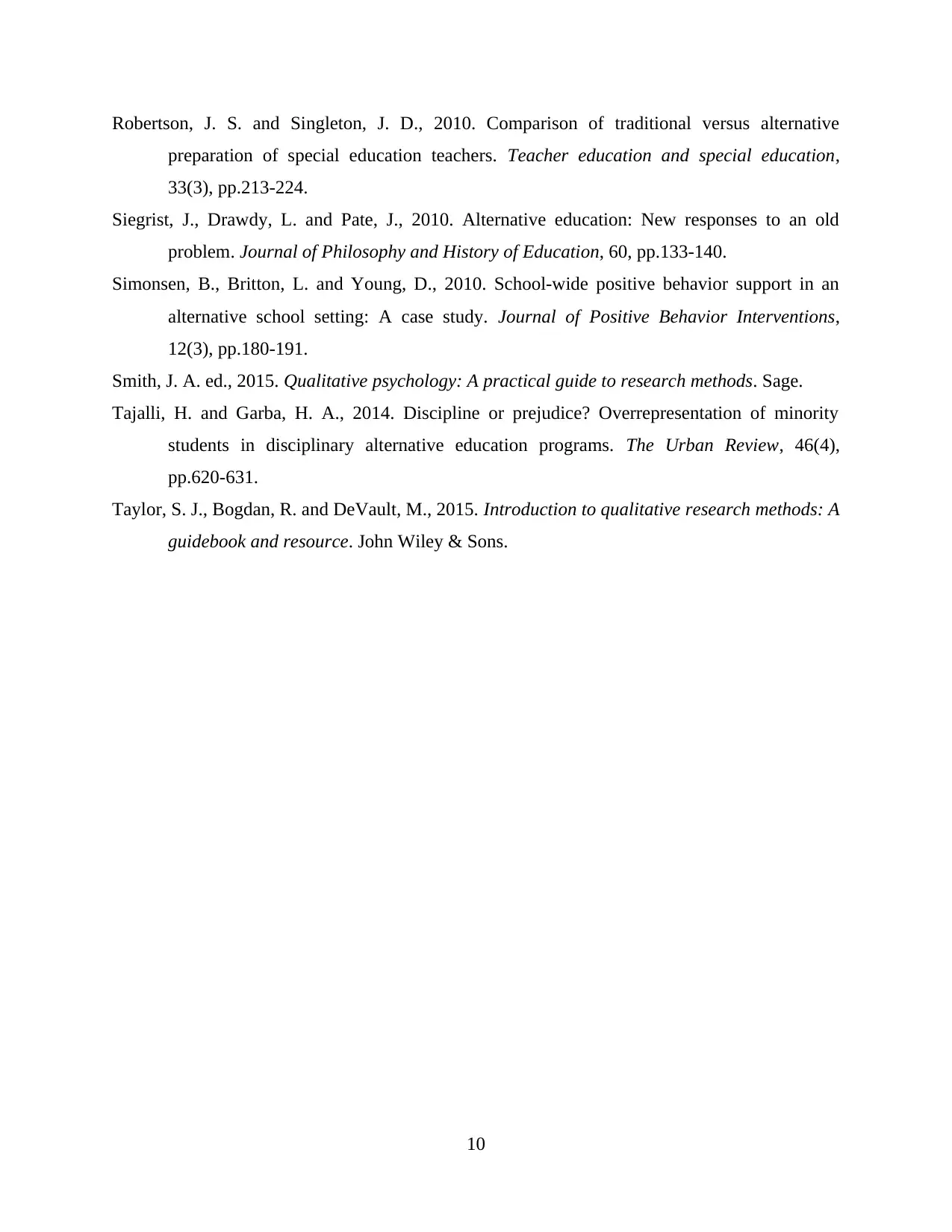
Robertson, J. S. and Singleton, J. D., 2010. Comparison of traditional versus alternative
preparation of special education teachers. Teacher education and special education,
33(3), pp.213-224.
Siegrist, J., Drawdy, L. and Pate, J., 2010. Alternative education: New responses to an old
problem. Journal of Philosophy and History of Education, 60, pp.133-140.
Simonsen, B., Britton, L. and Young, D., 2010. School-wide positive behavior support in an
alternative school setting: A case study. Journal of Positive Behavior Interventions,
12(3), pp.180-191.
Smith, J. A. ed., 2015. Qualitative psychology: A practical guide to research methods. Sage.
Tajalli, H. and Garba, H. A., 2014. Discipline or prejudice? Overrepresentation of minority
students in disciplinary alternative education programs. The Urban Review, 46(4),
pp.620-631.
Taylor, S. J., Bogdan, R. and DeVault, M., 2015. Introduction to qualitative research methods: A
guidebook and resource. John Wiley & Sons.
10
preparation of special education teachers. Teacher education and special education,
33(3), pp.213-224.
Siegrist, J., Drawdy, L. and Pate, J., 2010. Alternative education: New responses to an old
problem. Journal of Philosophy and History of Education, 60, pp.133-140.
Simonsen, B., Britton, L. and Young, D., 2010. School-wide positive behavior support in an
alternative school setting: A case study. Journal of Positive Behavior Interventions,
12(3), pp.180-191.
Smith, J. A. ed., 2015. Qualitative psychology: A practical guide to research methods. Sage.
Tajalli, H. and Garba, H. A., 2014. Discipline or prejudice? Overrepresentation of minority
students in disciplinary alternative education programs. The Urban Review, 46(4),
pp.620-631.
Taylor, S. J., Bogdan, R. and DeVault, M., 2015. Introduction to qualitative research methods: A
guidebook and resource. John Wiley & Sons.
10
⊘ This is a preview!⊘
Do you want full access?
Subscribe today to unlock all pages.

Trusted by 1+ million students worldwide
1 out of 13
Your All-in-One AI-Powered Toolkit for Academic Success.
+13062052269
info@desklib.com
Available 24*7 on WhatsApp / Email
![[object Object]](/_next/static/media/star-bottom.7253800d.svg)
Unlock your academic potential
Copyright © 2020–2025 A2Z Services. All Rights Reserved. Developed and managed by ZUCOL.

